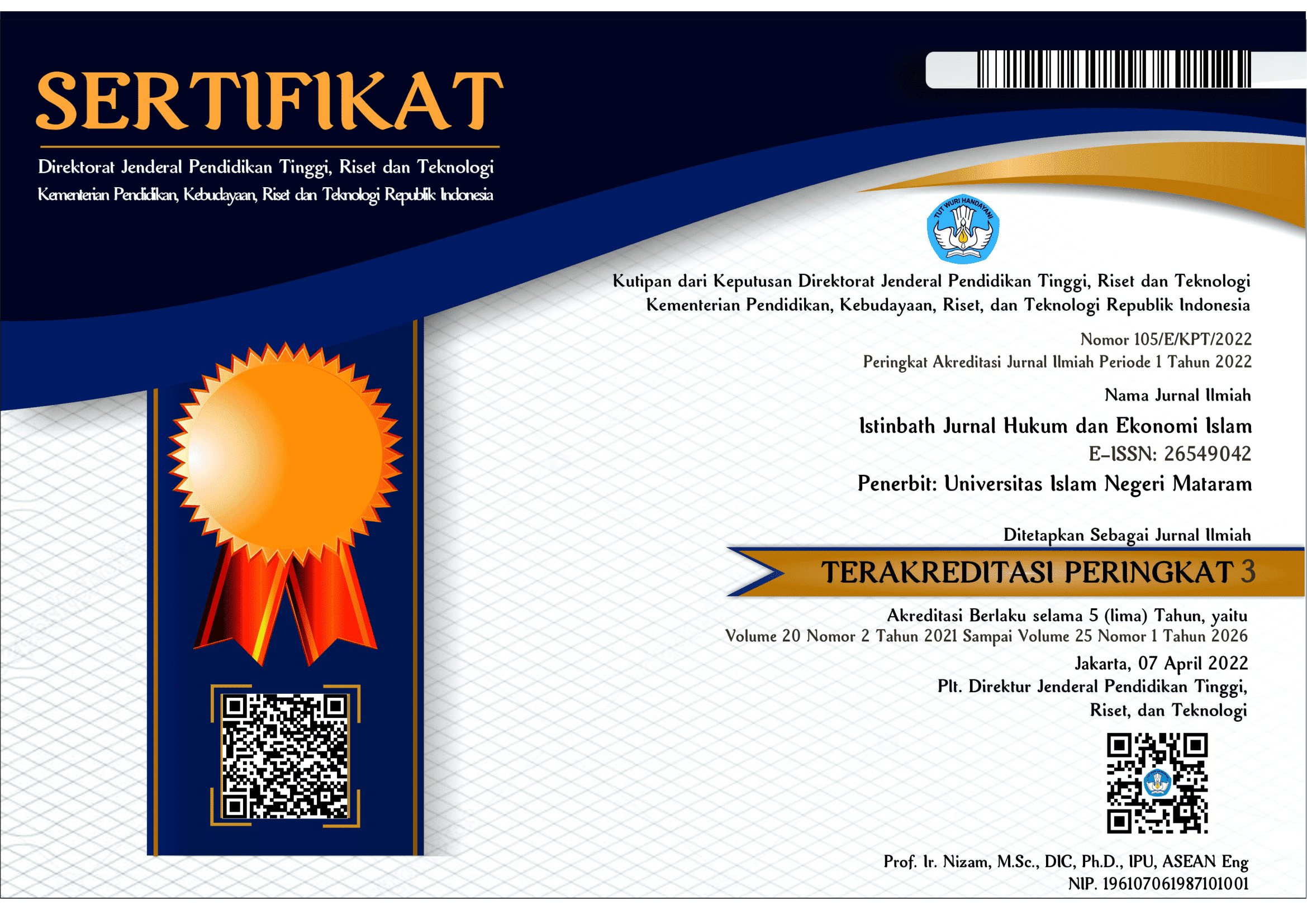PRODUCTIVE MANAGEMENT OF ZAKAT FUNDS FOR MUSTAHIQ EMPOWERMENT AT THE ORPHAN FRIEND DORMITORY IN MEDAN CITY
DOI:
https://doi.org/10.20414/ijhi.v23i1.735Keywords:
productive zakat, empowerment, mustahiqAbstract
This research aims to determine how to manage productive zakat funds to empower mustahik in the Sahabat Yatim Dormitory. This research focuses on how zakat funds are collected, allocated and utilized to improve the welfare of mustahik, especially orphans and poor people. Management of productive Zakat funds for the empowerment of Mustahik Sahabat Yatim is an effort to enhance the welfare of underprivileged communities, especially abandoned orphans who are unable and can be used for educational and future needs. The research method is descriptive qualitative and uses observation, interviews and documentation. This analysis technique uses three inductive data analysis processes: processing data, presenting data, and drawing conclusions. The results of this research show that productive management of Zakat funds in Sahabat Yatim can encourage inclusive economic growth and provide a sustainable positive impact on society. It also provides an important contribution to the practical and theoretical understanding of the role of productive zakat in empowering mustahik, especially for orphans.
References
Abdul, Aziz Dahlan. 1996. “Encyclopedia of Islamic Law.” P. 198 in. Jakarta: PT. Van Hoeve's New Effort.
Adel, Sarea. 2012. "Zakat as a Benchmark to Evaluate Economic Growth: An Alternative Approach." International Journal of Business and Social Science 3:242–45.
Afghany, Ghifar, Ilyas, and Teuku Muttaqin Mansur. 2023. "THE BENEFITS AND PROTECTION OF CHILDREN IN DETERMINATION OF GUARDIANSHIP (JURIDICAL ANALYSIS OF THE DETERMINATION." Journal of Islamic Law and Economics 22(2):278–92.
Ansori, Teguh. 2018. "MUSTAHIK EMPOWERMENT IN LAZISNU PONOROGO." Journal of Muslim Heritage 3(1):165–83.
Chaniago, Siti Aminah. 2015. "EMPOWERMENT OF ZAKAT IN ELIMINATING POVERTY." Journal of Islamic Law 13(47):47–56. doi: http://e-journal.stain-pekalongan.ac.id/index.php/jhi EMPOWERMENT.
Fitri, Maltuf. 2017. "Productive Zakat Management as an Instrument for Improving the Welfare of the Maltuf Fitri Community. Introduction Zakat is an obligation that a person must fulfill." Journal of Islamic Economics 8(1):149–73. doi: DOI: http://dx.doi.org/10.21580/economica.2017.8.1.1830 Management.
Haq, M. Ashraf Al, Norazlina Binti, and Abd Wahab. 2017. "EFFECTIVE ZAKAH DISTRIBUTION: HIGHLIGHTING FEW ISSUES AND GAPS IN KEDAH, MALAYSIA." Journal of Sharia Economics 9(2):259–88. doi: 10.15408/aiq.v9i2.4002.
Kailani, Najib, and Martin Slama. 2020. "Accelerating Islamic Charities in Indonesia: Zakat, Alms and the Immediacy of Social Media Accelerating Islamic Charities in Indonesia: Zakat, Alms and." Journal of South East Asia Research 28:70–86. doi: 10.1080/0967828X.2019.1691939.
Lubis, Muharram, Nurul Ibtisam Yaacob, Yusoff Omar, and Abdurrahman A. Dahlan. nd "ENHANCEMENT OF ZAKAT DISTRIBUTION MANAGEMENT SYSTEM: CASE STUDY IN MALAYSIA." Journal of the International Islamic University Malaysia.
Mustafa Edwin Nasution. 2009. Indonesia Zakat and Development Report. Depok: CID.
Ni'mah, Miftahun. 2013. "Effectiveness of Spiritual Character Formation to Increase Optimism for the Future of Orphaned Children." Journal of Psychological Intervention 5(1):1–24.
Nugrahani, Imas Rosi. 2019. "The Role of Productive Zakat in Mustahiq Economic Empowerment (Case Study of the Amil Zakat Institution Dompet Dhuafa Republika Yogyakarta 2017)." Indonesian Journal of Sharia Economics IX(1):30–41.
Rusniati, Rinda, Nurul Hak, and B. Idwal. 2020. "Zakat Empowerment Strategy in Reducing Poverty in Bengkulu City." Sharia Economic Management Business 1(3):8–14.
Santori, Djam'an, and Aan Komariah. 2009. Qualitative Research Methodology. Bandung.
Sarea, Adel. 2012. "Zakat as a Benchmark to Evaluate Economic Growth: An Alternative Approach." International Journal of Business And Social Sciences 3:242–45.
Sartika, Mila. 2008. "The Effect of Productive Zakat Utilization on Mustahiq Empowerment in the LAZ of the Solo Peduli Surakarta Foundation." Journal of Islamic Economics II(1):75–89.
Sazali, Hasan, Rizal Agus, and OK Bilqis Amini. 2022. "The Role Of Muslim Entrepreneurs In The Coal Weaving Industry During Pandemic Based On Local Wisdom." Scientific Journal of Islamic Economics 8(01):468–73. doi http://dx.doi.org/10.29040/jiei.v8i1.4608.
Soemitra, Andri. 2009. Sharia Banks and Financial Institutions. Jakarta: Kencana Prenadamedia.
Sunartiningsih, Agnes. 2004. Community Empowerment Strategy. Yogyakarta: Aditya Media.
Suyanto, Nedi Hendri. 2015. "ANALYSIS OF MODELS FOR THE USE OF ZAKAT FUNDS IN EMPOWERING POOR MUNICIPAL COMMUNITIES IN LAMPUNG PROVINCE." ACQUISITION Journal 11(2):63–73.
Suyitno. 2005. Anatomy of Zakat Fiqh. Yogyakarta.
Utami, Princess Rahmanissa Tri Puji. 2018. "The INFLUENCE OF CAPITAL ASSISTANCE, SKILLS TRAINING, AND MENTORING ON INCREASING MUSTAHIK INCOME ON THE EMPOWERMENT OF ZAKAT, INFAK AND SHADAQAH BAZNAS YOGYAKARTA CITY." Journal of Education and Economics 7(6):545–53.
Widiastuti, Tika, Scientist Auwalin, Lina Nugraha Rani, Ubaidillah Al Mustofa, Tika Widiastuti, Scientist Auwalin, and Lina Nugraha Rani. 2021. "Cogent Business & Management A Mediating Effect of Business Growth on Zakat Empowerment Program and Mustahiq's Welfare A Mediating Effect of Business Growth on Zakat Empowerment Program and Mustahiq's Welfare." Cogent Business & Management Journal 8(1):1–18. doi 10.1080/23311975.2021.1882039.
Zuhri, Muhammad, Muhammad Sholahuddin, and Moechammad Nasir. 2023. "THE INFLUENCE OF ZAKAT LITERACY AND TRUST ON DECISIONS AND AWARENESS OF PAYING ZAKAT THROUGH AMIL ZAKAT INSTITUTIONS USING THE SEM-PLS METHOD." Journal of Islamic Law and Economics 22(2):235–46.
Zumrotun, Siti. 2016. "Opportunities, Challenges and Zakat Strategies in Empowering the Community's Economy." Ahkam Journal 16(1):97–104.
Downloads
Published
How to Cite
Issue
Section
License
Copyright (c) 2024 Rofifah Abiyyah Lubis, Hasan Sazali

This work is licensed under a Creative Commons Attribution-ShareAlike 4.0 International License.





